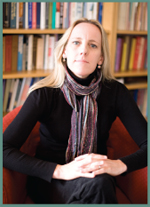If the Enrichment of Humanity is our Project, Tighter Bonds and Bigger Gifts May be the Key

A recent New York Times piece by Molly Worthen (author of the book Apostles of Reason: The Crisis of Authority in American Evangelicalism) examines a group she calls “the podcast bros”—wellness gurus based largely in the western United States who host podcasts on which they discuss fitness optimization, brain boosting, ways to achieve professional success, and the ingestion of myriad combinations of plant matter. They’ve formed a large virtual following that many listeners say feels more like a community.
The so-called podcast bros, Worthen says, are “spiritual entrepreneurs who are filling the gap left as traditional religious organizations erode, and modernity frays our face-to-face connections with communities and institutions.” But wait, humanists are thinking, isn’t filling the gap left by the decline of religious affiliation one of our main goals as well?
Reading Worthen’s detailed examination, it seems that the sense of affiliation the bros have birthed is achieved largely through a rigorous and regimented pursuit of individualism. What we examine in this issue of the Humanist is the idea that humanists need to step up and embrace a bit more tribalism in order to fill the gap created by emptier pews and half-full collection plates. If the enrichment of humanity is our project, tighter bonds and bigger gifts may be the key.
Former Humanist editor and longtime humanist leader Fred Edwords and Foundation Beyond Belief (FBB) founder Dale McGowan provide the evidence that church attendance is on the wane and secularism is rising. But as the religious right tries to hold onto its power, the lack of unity among nonbelievers comes into sharp relief. “For all the negatives,” McGowan writes, “the Christian church has some positive and culturally important achievements to its credit. As the temple falls, those of us on the outside must quickly learn how to achieve those things just as well without the negatives.” A giving culture, he goes on to show, must be “systematic, personally aspirational, and tied to a community of shared values.”
Now, I hope I don’t hurt any humanist’s feelings by saying humanists aren’t always the best company. Or rather, as McGowan points out, we don’t always feel the need to be around each other. And that’s got to change.
What I’m saying is that if, as a secular humanist, an atheist, agnostic, etc., you find it hard to conceive of embracing anything resembling organized religion— maybe you were traumatized by experiences in the church; maybe you generally don’t like meeting in groups because, as we all know, people can be annoying; maybe you don’t think godlessness is a unifying enough premise, or you’d simply rather hang out with a bunch of ultimate frisbee players or Game of Thrones enthusiasts—the time has come to commit to organized humanism. Time to join a humanist group, make good friends within it (find your frisbee peeps), and participate in actions that promote it. (An element not addressed in the discussion herein is the bonus of charismatic leaders whose integrity is unimpaired.)
Sometimes getting to know each other starts with bumping up against each other. As Tom Krattenmaker puts it in “A New Vision for Secular Transcendence,”
Humanity’s dicey moment requires us to realize and act on the truth that we are surrounded by much that matters to our left and our right, in front of us and behind us. Each of our lives is set in a swirling teem of people, some near to us but most of them far away, some familiar to us but most of them not.
And so the time has come to strengthen humanist bonds and to recruit the “nones.” As climate change continues to produce extreme weather events and negatively impact lives in myriad other ways, efforts like FBB’s Humanist Disaster Recovery Program (described in these pages in vivid and comprehensive fashion by Wendy Webber) must be well supported. Social justice efforts to address multiple forms of inequality must be prioritized. Just as we’ve seen so many progressive Americans inspired to run for office or work on campaigns to resist encroaching authoritarianism, it’s time for the humanists to get out there, together.
